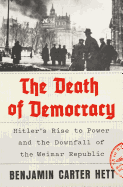
Parliamentary politics seldom makes for propulsive reading. Yet, with the fate of Weimar Germany and tens of millions of lives on the line, the machinations of men like Paul von Hindenburg, Kurt von Schleicher and Heinrich Brüning in the late 1920s and early 1930s becomes the stuff of thrillers. In The Death of Democracy: Hitler's Rise to Power and the Downfall of the Weimar Republic, historian Benjamin Carter Hett (Burning the Reichstag; Death in the Tiergarten) delves into the death throes of interwar German democracy.
The Weimar Republic's tumultuous foundation made it a fragile system. Created after losing World War I, this parliamentary government became a scapegoat for the humiliating reparations and territorial losses imposed by the Treaty of Versailles. Between hyperinflation in the early '20s, mass unemployment during the Great Depression and a constant simmer of political violence, it was a miracle this system lasted as long as it did. By the early '30s, the Reichstag was paralyzed by radicalized extremes on the left and right--the Communists versus the Nazis--with a crumbling center-left and center-right unwilling to unite against either force.
Still, Hitler's takeover was far from inevitable. Hett shows how personal blunders--often by Reich president and octogenarian war hero Paul von Hindenburg, though also by other conservatives seeking to use Hitler's populist power for their own gain--allowed the Nazis to seize control. Weimar's final destruction came with the 1933 Enabling Act, when the Reichstag--freshly purged of Communists and crawling with armed stormtroopers--gave Chancellor Hitler extraordinary powers. The Death of Democracy is an accessible account of the many missteps that led to that moment, and teaches a few chilling lessons for the modern day. --Tobias Mutter, freelance reviewer

